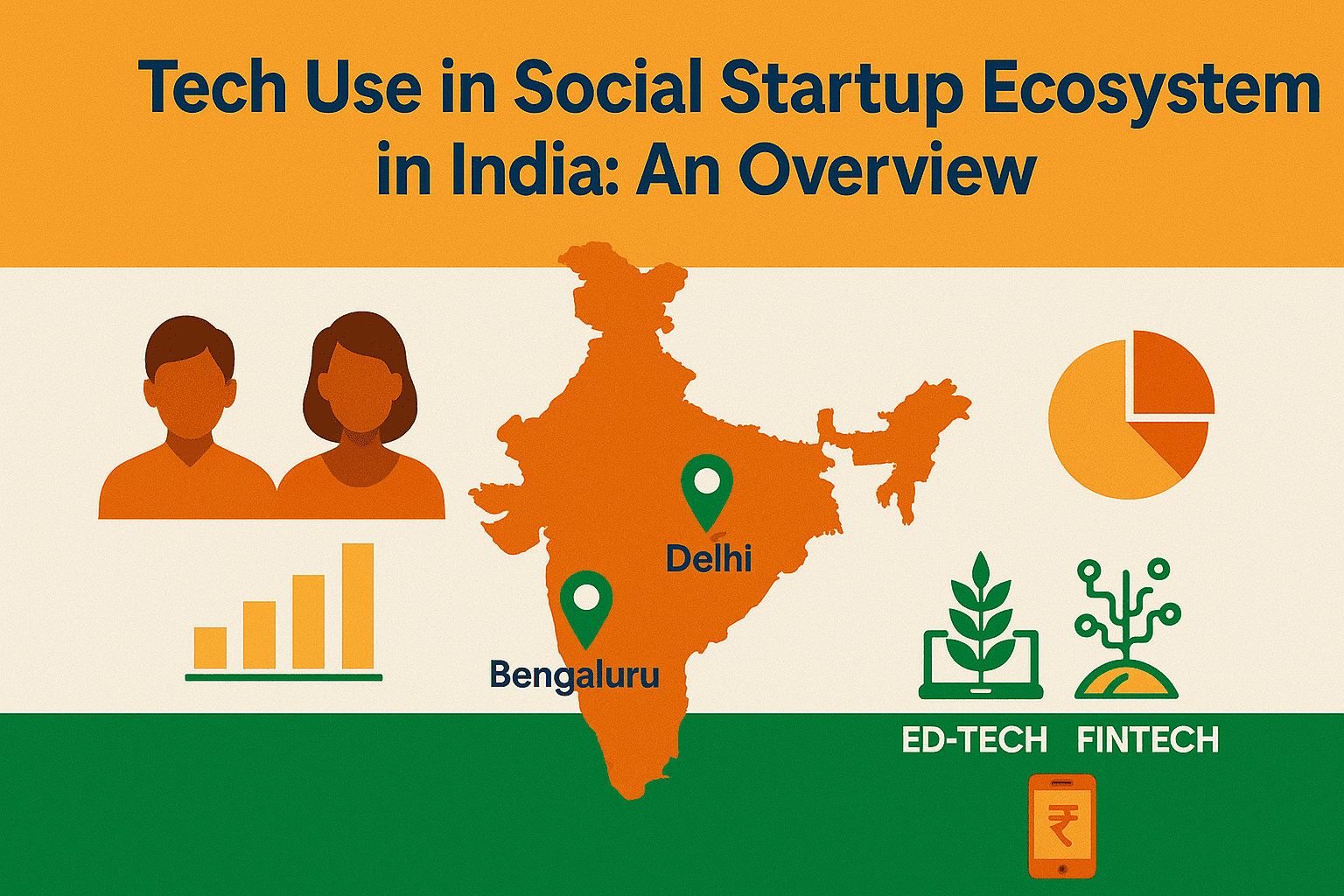
03 May Tech Use in Social Startup ecosystem in India: An Overview
Banner image generated using ChatGPT, OpenAI May 2nd 2025
This article is part of series on Tech-based Social Startups in India. The first article covered AI and Social Startups.
Technology has massive potential to amplify social impact as it can help scale solutions. While this is well established, outside some sectors, the use of technology, especially emerging technologies (i.e. IT, IoT, AI, Drones, Robotics, etc.) in the social impact ecosystem is limited. This article takes a limited look at the State of technology use in Social Enterprises ecosystem.
Data Source
As social enterprises and social startups in India are not legally defined categories, there is no consolidated database of social startups in India. Insights into the ecosystem need to be drawn based on secondary data and curated list of startups.
For the purpose of this article, we are defining Social Enterprise as any for -profit entity that makes social impact through their business models which aims to address unmet social or environmental needs. They can be working for:
- People at the grassroots or marginalized people. For e.g. people with disabilities, improving access to clean water for poor
- Society at large [have more broad-based impact] for e.g. Environment, Healthcare, etc.
We have prepared a curated a list of 450+ Social Startups in India created by us from publicly listed portfolios of Incubators, databases, Investors, etc. after reviewing 2000+ startup from these sources.. Approx 100+ of these startups are from 4 Social Incubators and Investors. These are Social Alpha, Upaya Social Ventures (USV), Acumen and Surge Impact. [Rest of the startups are from other source like Tech and business incubator, Investors etc. We will present their analysis in a future article.] While in no way comprehensive or statistically robust, it does give a snapshot of the ecosystem. Social Startups from these four sources were curated into a list of 100+ enterprises which generally contain social startups which are founded in 2014-15 and later. Also, any not-for-profit social enterprises have been excluded. Also, in case any of the startups are explicitly known to have ceased operations or pivoted away from their social mission, then they are excluded. This list has also been tagged as using tech, and type of tech and sector based on publicly available data.
So how is tech used in Social Startup Ecosystem?
Even in this curated list of 100+ startups from these four Social Incubators and Investors most Social Startups use tech as part of their core business model. This is not a surprise, given many of the sources like Social Alpha and USV make investments in their cohort and Acumen is an investor in social startups. Approx. 73% of these Social Startups use tech as part of their core business model. [Fig 1]

However, as we dig into the data, some clear trends emerge. First, majority of the startups don’t use IT/Emerging tech [AI, CV, SAAS, Robotics etc.]. They tend to be more Mechanical or Chemical engineering, etc or have not tech. Reason(s) for this will be clear when we look at sectors in the next article in this series. Approx 41% of these social startups use IT/Emerging tech, 32% use Mechanical or Chemical engineering or Biotech and rest use no tech at all. [Fig 2]

We further analyse this in terms of the type of tech innovation they are using as part of their business model. This is done by identifying which of them use Deep tech as part of their solution. We have defined Deep tech as any tech innovation which directly flows from research and/or requires a significant research input and/or is at cutting edge of tech development. As this is a soft criterion, a significant judgement call was used in classifying these startups as Deep tech and data should not be treated as absolute hard data. Also note Deep Tech includes both IT and non-IT tech if they meet the above criteria.
With this caveat, Deep tech consists as small subset of tech-based social startups from this database. (approx. 19%) (Fig 3). In most other cases, the tech used is a modification or derivation of existing technologies, applied to specific use cases of these social startups. In fact, these Deep tech Startups just constitute 15% of total Social Startups in the database.


While a significant 73% of these startups integrate technology into their core business models, the nature of technology used varies widely. Contrary to popular focus on IT-based innovations like AI or SaaS, a large proportion of these startups employ Mechanical, Chemical, or Biotech solutions, often tailored to address grassroots or environmental challenges. Only around ~41% use IT or emerging technologies, whereas about 32% apply engineering or biotech solutions, and a minority operate with minimal tech integration. Take example of two startups from Social Alphas cohort [these were earlier part of AIC-IIIH too] Ecowrap and Angirus Ind. Both this Startups are from Waste management sector. Angirus use Mechanical and Chemical tech to convert Plastic waste and Construction & demolition waste to make Bricks and Paver blocks that are Damp-proof and Lightweight [1]. Ecowrap on other hand uses AI-based monitoring systems to track source segregation at the household level in Jaipur [2].
Conclusion
The analysis highlights that while technology is central to many Indian social startups, its nature is often utilitarian and sector-specific rather than driven by emerging or deep tech. The use of advanced technologies like AI or robotics remains limited, reflecting perhaps sectoral constraints or the practical focus of these enterprises. Nonetheless, the steady presence of tech-enabled models underscores the critical role of innovation in scaling social impact. As the ecosystem matures, there’s scope for more structured adoption of deep tech, especially when aligned with grassroots needs and inclusive design.
Footnotes:


